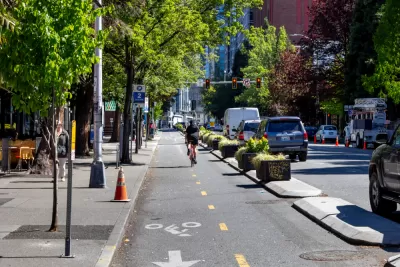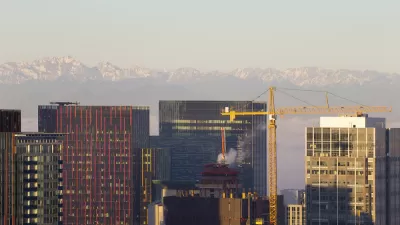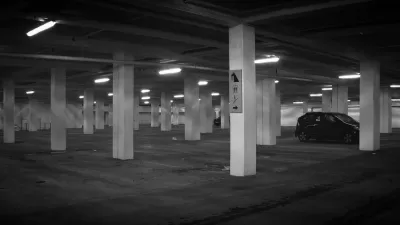In a set of recommendations submitted to the city, the commission calls for revised land use and transportation policies that reclaim public space from cars and shift focus away from vehicle throughput to more pedestrian-oriented uses.

A document submitted to the city of Seattle by its Planning Commission outlines an ambitious set of recommendations aimed at reclaiming public right-of-way for people, mitigating the impact of climate change, and improving safety on the city’s streets. The brief notes that road deaths and injuries are on the rise in spite of the city’s Vision Zero pledge.
“The brief goes on to note that the city will not be able to accommodate the growth anticipated in the coming decades if streets continue to be used in the same way they are now, stating that the status quo will ‘literally kill us,’” Ryan Packer writes in The Urbanist. The Commission calls on the city to include their recommendations in the update of the Seattle Comprehensive Plan, which will undergo a major update in 2024.
“Among the Planning Commission’s recommendations is the removal of vehicle storage from the current Comprehensive Plans’s list of needs that should be accommodated on city streets,” calling instead for “a citywide parking policy and plan that looks to balance revenue needs with opportunities for multi-function streets that provide more options, public space, and environmental benefits.”
The commission also highlighted the discrepancy between the proposed comprehensive plan update and the Seattle Department of Transportation’s Transportation Plan, which, according to a letter sent to SDOT earlier this year, “appear[s] to assume a future high rate of trip-making by privately owned vehicles, with the only variable being whether those vehicles are electric.” The focus on electrification, the commission pointed out, “will miss an opportunity to evaluate alternatives that the City has far more influence over, and that align with the forthcoming update to the Comprehensive Plan.”
As Packer notes, it remains to be seen whether the mayor and city council will adopt the Planning Commission’s bold, transformative vision for more sustainable and equitable land use and transportation planning.
FULL STORY: Planning Commission Pushes for Bolder One Seattle Plan Re-envisioning City Streets

Study: Maui’s Plan to Convert Vacation Rentals to Long-Term Housing Could Cause Nearly $1 Billion Economic Loss
The plan would reduce visitor accommodation by 25,% resulting in 1,900 jobs lost.

North Texas Transit Leaders Tout Benefits of TOD for Growing Region
At a summit focused on transit-oriented development, policymakers discussed how North Texas’ expanded light rail system can serve as a tool for economic growth.

Why Should We Subsidize Public Transportation?
Many public transit agencies face financial stress due to rising costs, declining fare revenue, and declining subsidies. Transit advocates must provide a strong business case for increasing public transit funding.

How to Make US Trains Faster
Changes to boarding platforms and a switch to electric trains could improve U.S. passenger rail service without the added cost of high-speed rail.

Columbia’s Revitalized ‘Loop’ Is a Hub for Local Entrepreneurs
A focus on small businesses is helping a commercial corridor in Columbia, Missouri thrive.

Invasive Insect Threatens Minnesota’s Ash Forests
The Emerald Ash Borer is a rapidly spreading invasive pest threatening Minnesota’s ash trees, and homeowners are encouraged to plant diverse replacement species, avoid moving ash firewood, and monitor for signs of infestation.
Urban Design for Planners 1: Software Tools
This six-course series explores essential urban design concepts using open source software and equips planners with the tools they need to participate fully in the urban design process.
Planning for Universal Design
Learn the tools for implementing Universal Design in planning regulations.
City of Santa Clarita
Ascent Environmental
Institute for Housing and Urban Development Studies (IHS)
City of Grandview
Harvard GSD Executive Education
Toledo-Lucas County Plan Commissions
Salt Lake City
NYU Wagner Graduate School of Public Service





























